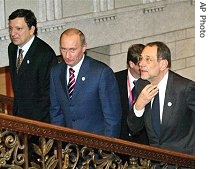2006年VOA标准英语-Russia-EU Summit Scores Small Progress(在线收听)
By Lisa McAdams
Moscow
24 November 2006
Russia and the European Union were unable to start negotiating a key trade deal when at a meeting in Helsinki Friday, after Poland blocked progress due to Russia's ban on its meat imports. We hear more from VOA's Lisa McAdams in Moscow.
---
European Union and Russian leaders were forced to settle for progress on several smaller issues, rather than open key talks on a new partnership agreement between EU member states and Moscow, during their one-day summit in Helsinki Friday.
The European Commission can only start negotiating the agreement when all 25 EU member states have given it a mandate to do so. But, Poland refused after Russia banned imports of its meat and other agricultural products.
 |
| EU Foreign Affairs and Security Chief Policy Javier Solana, (r), Russian President Vladimir Putin and EC President Jose Manuel Barroso, (l), at EU-Russia summit in Helsinki, 24 Nov. 2006 |
Despite the setback, European Commission President Jose Manuel Barroso says the European Union and Russia remain on good terms.
"I think we can say that we achieved important progress with Russia, a very important strategic partner and a close neighbor," he said. "It's true it was not possible for the summit to launch negotiations for a new agreement with Russia to replace the existing PCA [partnership and cooperation agreement], but we can not escape our common future. We will work to launch it as soon as possible."
Mr. Barroso says the existing Russia-EU partnership agreement, due to expire late next year, will continue until a new one is ready to be signed.
The summit did, however, produce a deal aimed at ending a decades-old dispute over fees Russia charges foreign aircraft to fly over Siberia. The fees cost European carriers more than $300 million annually. But under terms of Friday's deal, Russia will phase out the surcharges by the end of 2013.
EU Trade Commissioner Peter Mandelson says the deal shows the EU and Russia can resolve trade disputes by negotiation when there is a will to do so. Mr. Mandelson's comment is particularly interesting given that Russia is now threatening to impose a ban on imports of EU meat products beginning the first of next year.
Moscow says it is uncertain whether products from new members Romania and Bulgaria are safe for consumption. Seeking to head-off yet another potentially thorny dispute, the European Commission earlier announced it will be sending a team of experts to Moscow next week to try and ease Russian fears.
The summit also yielded an EU offer to support Russia in its bid to gain entry into the World Trade Organization, possibly as early as next year. But on the more contentious issue of energy policy, Friday's talks were inconclusive.
Russia reiterated it would not ratify a new energy charter aimed at opening up its oil-and-gas market to foreign investment in its current form. Russia says it supports the charter in principle, but that more talks are needed. Brussels says the charter is necessary to boost security and efficiency, especially since Russia supplies the European Union with about one-third of its energy needs.
EU High Commissioner Javier Solana says Friday's discussions also touched on issues of concern beyond EU or Russian borders, including Iran and the ongoing violence in the Middle East.